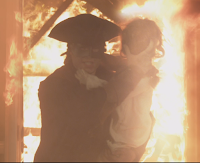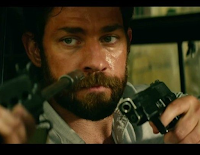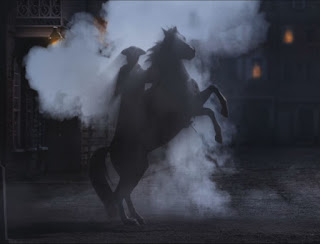Movie: Beyond the Mask
Length: 103 min
Rated: PG
Starring: Andrew Cheney, Kara Kilmer, John Rys-Davis
Director: Chad Burns
Producers: Aaron Burns
Screenplay: Paul McCusker
Preface: Almost six years ago I reviewed an earlier Burns Family Studios production titled
Pendragon: Sword of His Father. This was an independent and completely in-house production, seemingly populated by every Burns family member in creation. For all that, it was a
really good effort. Some continuity issues and unprofessional acting vied for attention with other decent actors, an interesting plot, decent effects, and a true eye for beauty that resulted in memorable scenes beautifully framed.
Now the same studio makes a full-court press with
Beyond the Mask. It still has plenty of Burnses involved, but the screenplay is by Paul McCusker, an accomplished writer known to Christians for his work with
Adventures in Odyssey — who, since then, has sadly
apostatized to
Roman Catholicism.
The three lead roles are also professional actors, probably most famous of them being John Rhys-Davis, known as Sulla in the Indiana Jones movies, Gimli in the Lord of the Rings movies, and many other roles.
So what of this effort?
Bottom Line: I watched it with my family and in-laws. The six of us ranged in ages from 15 to 79. We all enjoyed it, many very enthusiastically so. We all would recommend it to anyone. It's a good, well-done family movie.
Review: the story begins in the timeframe of the signing of America's Declaration of Independence. As the movie opens, we hear the voice of the main character, William Reynolds, introducing us to "this monster called the East India Company." He is speaking guiltily to "Charlotte" — who? Why? We were intrigued.
When watching an independent production, one always begins with bated breath. Production quality is often low, if well-intentioned. First impressions cast a shadow over the rest of the experience.
In this case, opening scenes immediately and ably take us to England in 1775 and introduce us to the speaker, William Reynolds (Andrew Cheney), who serves as an assassin and intriguer for that organization. With relief, we see that the hand behind this movie has an expert eye for a beautifully-framed scene, as we often observed and remarked in reviewing Pendragon. This is our first, night-time view:
 |
| CLICK TO ENLARGE |
It is the first of many beautifully framed period shots sparkling throughout the film. Later, we're shown revolutionary-era Philadelphia:
Back to the start: this peaceful view immediately bursts into action, in almost a steampunk sniper situation. Protagonist Reynolds and his assistant briskly set up and launch a mission to replace critical documents that would have been damaging to the EIC. After this Reynolds hands over the unfavorable report to EIC employer, Charles Kemp (John Rhys-Davies). We learn that Reynolds wants out; he's had enough of his life as an assassin, and wants to live a new life enjoying the rewards that Kemp promised him. Kemp pleads with him to stay on and be his man in America, but Reynolds is resolute.
As it turns out, the EIC's retirement plan for Reynolds involves planting a bomb on the carriage that he thinks will bear him to his new life. However, on the road, a clergyman-to-be sees the bomb's sparks, and rides in pursuit to warn the carriage. In the ensuing action, Reynolds' rescuer is killed and Reynolds is wounded. He takes on the identity of the erstwhile vicar, and rides to the vicar's new church, to take on his duties and his life.

When he arrives, he is half-dead, and must be rescued by the lovely Charlotte Holloway (Kara Killmer). In the ensuing developments, Reynolds recovers and makes a shaky start as vicar to a very (very!) gracious little congregation, and his relationship with and feelings for Charlotte blossoms.
Reynolds eventually wants to marry Charlotte, but he has not been honest about his past. When his old boss learns he's not dead yet, our hero once again is targeted, and eventually flees. Reynolds means to earn Charlotte's love by undoing some of his wrongs and becoming a hero to the patriots in America. He becomes a sort of Zorro figure, a masked man on a horse, rescuing those in peril and thwarting the violence of the East India Company conspirators.
Reynolds eventually thwarts an assassination attempt, but in the effort he is himself framed as the assassin, which is all too easy to do, given his past. All looks dim. Reynolds has lied to Charlotte, he's failed in his attempt to earn grace, and he's about to be hanged. What will happen?
At this point, to continue the narrative would be to spoil the plot. So:
What's great about the movie? Scene after scene, as I've mentioned, is simply
beautiful. Since the movie was all shot in modern Michigan, obviously some must be CGI — yet it's done flawlessly and well. The CGI has to be supplemented with real sets and, as in Pendragon, they are all very well-done and authentic as well.
There are many
action sequences, involving pursuits, fist-fights, sword-fights, shooting, and explosions. They're all done really excellently, top-notch. There's even a rooftop pursuit:
This is no small matter. I've recently seen studio movies, fully financed and done by "professionals," which fudge the action scenes by nauseatingly shaky-camera shots, or snip-snip-snip over-editing. This movie does neither. The climactic scenes even go steam-punk on us, in a mostly-successful (more in a moment) reach.
The
acting of the principals is all well done, including the actor who plays Benjamin Franklin (!). There are no distracting dead-notes as there were in Pendragon. The dialogue is largely believable and largely natural. There are touches of
humor, and a number of surprising
plot-twists.
In most scenes the
music is lush and appropriate, and highlights either the action or the mood of the scene.
The
plot is interesting and involving, and largely moves right along to resolution, holding our interest.
What's less great? There are no elements that spoil the movie, though if I didn't mention a quibble or two, you'd think it wasn't me. For my part, I kept being taken a bit out of the lovely scenes by the
lighting. These were outdoor or indoor scenes, yet the actors faces and clothes would shine brightly white on the sides with what was clearly theatrical lighting, not anything like ambient light. It was so pronounced as to distract me several times.

My dear wife noted that, though the last part of the movie was June-July, the actors' breath made steam, even indoors. She also wondered where the rather anachronistic cabling came from in a strategic sequence.
My older son Josiah, with his eye for detail on all matters relating to weaponry, squawked a couple of times when actors holding what were supposed to be flintlock pistols carried them aimed straight into the air. That's the proper way to carry a modern pistol; it would have been disastrous with a flintlock pistol.
I felt the whole imposter-vicar portion of the movie was brushed by. After the initial scene, we were given nothing to help us understand how a fellow who clearly knew nothing about religion carried off this
Is there Gospel? Yes, clearly enough but very briefly. It's a Christian movie, or Christianoid — given that the writer is a Roman Catholic; but it's not a movie about Christianity.
Do you recommend it? Yes, very enthusiastically so. As I said, we all enjoyed it, men and women, young teens and almost-eighty. It's very well-done from start to finish.
This movie is being
released to theaters today, June 5. If it is playing near you and you're looking for a family movie, this is a great pick. It will be even better on a big screen with big sound.
The Burns Family Studios continues to strive for excellence in moviemaking. I look forward to future productions!






























